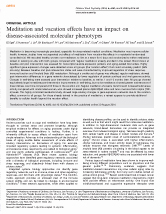Synopsis
This study examined the effects of a 6-day meditation retreat on transcriptome-wide expression patterns and aging-related biomarkers. Highly significant gene expression changes were found as a result of the meditation retreat and were characterized by improved regulation of the stress response, immune function, and Amyloid Beta (Aβ) metabolism. Regular meditators also showed a trend toward increased telomerase activity, suggesting beneficial effects on aging.
Systems Biology Research Study Reveals Benefits of Stress-Free Vacation and Meditation
It is important to note that while “vacation” had a beneficial effect on gene expression, the molecular signature of meditators was significantly different. When emotional and psychological assessments were conducted ten months after the study, the vacation group showed no change, the novice group showed the most dramatic change as a result of continued practice, and in the experienced meditators, there were additional benefits to cellular health.
Of additional importance is the vacation effect was designed to be stress-free in order to have comparable environments for all groups in the study. In other words, the group on vacation remained on the same diet as the meditation group (healthy Ayurveda diet) and there was no alcohol consumption. Moreover, external stressors such as travel/logistics, financial pressures were minimized across all groups.
While a stress free vacation certainly benefits the expression of gene networks in the direction of wellbeing, it is impossible and impractical to have a lifelong stress free vacation. On the other hand, it is practical to have a life long practice of meditation. For corporate leaders and health insurance providers, this should be an incentive to provide employees with a stress-free retreat and/or meditation programs as part of their wellbeing strategy.
ADDITIONAL INFORMATION:
PRESS RELEASES:
PUBLISHED RESEARCH PAPERS:
Meditation and vacation effects have an impact on disease-associated molecular phenotypes
Transl Psychiatry (2016) 6, e880; doi:10.1038/tp.2016.164
ES Epel, E Puterman, J Lin, EH Blackburn, PY Lum, ND Beckmann, J Zhu, E Lee, A Gilbert, RA Rissman, RE Tanzi and EE Schadt (July 2016)
Open PDF
